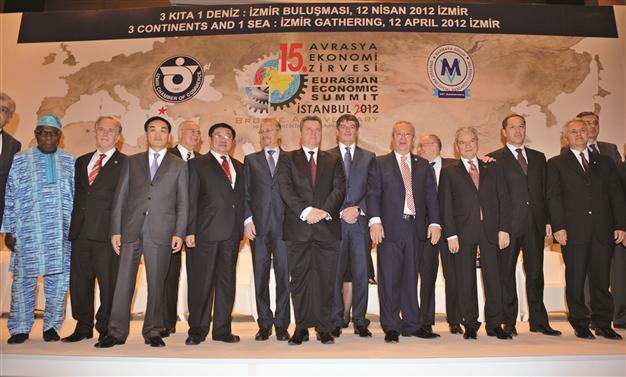Presidents pledge to fight poverty
IZMIR

Speakers at the İzmir leg of the Eurasian Economic Summit pose for a family photo at the end of the presidental session there. The key speakers at the event included former and current presidents from 13 countries. DAILY NEWS photo, Emrah GÜREL
The ambition to fight poverty marked the closing session of the 15th Eurasian Economic Summit, which gathered active and former presidents of several countries in the Aegean city of İzmir. Turkey’s Finance Minister Mehmet Şimşek also delivered a speech at the event.President of Albania Bamir Topi said in his remarks that a new start should be made in the struggle against world hunger. Tens of millions of people the world over are affected by an ongoing food crisis, he said. These people are forced to live without adequate and balanced nutrition. “We have to move forward to stop this as soon as possible. We are obliged to fight against poverty. We need a social-economic change to enrich Eurasia. Our differences will complete others’ missing parts. This is our richness. They create a major potential for us to co-operate. We are in a city now which is the center of a flow that affects every place on earth. Nothing in the world is isolated.”
Eurasian countries should create joint development policies, according to Gjorge Ivanov, the president of Macedonia. Development plans covering the period until 2050 should be put in place, and countries in the region should do this together, he said. “The G-8 countries have said they will write off the debts of poor countries next year. The [debt] figures are higher than arms expenditures.”
Filip Vujanovic, president of Montenegro, said the struggle against poverty in his country began in 2007, when measures were taken to improve health and education services. Vujanovic said employment is the third step in Montenegro’s action plan.
Mihail Formuzal, governor of Moldova’s autonomous territory of Gagauzia, said there are countries that are immune to the economic crisis. “According to statistics from the World Bank, one billion people suffered from hunger in 2009. This is not only a matter for poor countries now; developed countries are the part of the problem. We want to put this on the world’s agenda. The population of Gagauzia is migrating to developed countries such as Russia, Turkey, and the European Union countries. Thirty percent of Gagauzia’s people have left to country to work abroad.”
İzmir Chamber of Commerce (İZTO) President Ekrem Demirtaş, host of the session, said: “All of these messages have been clear: Hunger, poverty, and unemployment exist in the region, but the countries themselves are not responsible for these problems.”
In his closing statement, Akkan Suver, president of the Marmara Group Foundation, which organized the summit, noted that this year’s summit was heavily attended by representatives from China, Bosnia Herzegovina and Azerbaijan. Suver said he was particularly happy to have been honored with Mongolia’s President’s Medal, and to have seen a newly published book by Azerbaijani journalist Halit Niyazov, which tells the 15-year history of the Eurasian Economic Summit. The 300-page book, published by the foundation, is available from the Marmara Group.
















